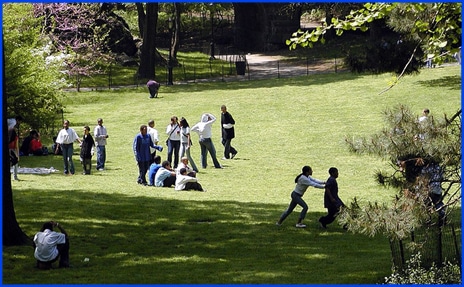
The National Institute on Out-of-School Time (NIOST) describes itself this way:
Our mission is to ensure that all children, youth, and families have access to high quality programs, activities, and opportunities during non-school hours. We believe that these experiences are essential to the healthy development of children and youth, who then can become effective and capable members of society.
NIOST is partly about research and partly about practice, which is why the Robert Woods Johnson Foundation chose it to bring together an alliance called the Healthy Out-of-School Time Coalition (HOST). With the ultimate goal of ending childhood obesity in mind, here is what they did:
Over the course of a year, HOST conducted a national online survey of more than 700 out-of-school programs across the country, and examined best practices and existing standards and guidelines for providing healthy eating and physical activity opportunities. The survey included participation from many local Ys, one of the nation’s largest providers of afterschool programs.
NIOST’s director Ellen S. Gannett believes that what goes on in the out-of-school programs can have a very big influence and be, in her words, “an important component” in the struggle against childhood obesity. The recommendations contain nothing new or startling — “yes” to fruits, vegetables, and water; “no” to junk food and soda.
The report is specific in urging that each program use at least 20% of its time, or half an hour, to physical activity. And if it’s an all-day program, then at least an hour of exercise is called for. The activity should encompass age-appropriate muscle and bone-strengthening activities, as well as cardio-respiratory fitness.
This is described by HOST as the first-ever comprehensive set of standards for out-of-school programs attended by kids in the years K-12. Around eight million children are served by out-of-school programs for at least three hours a day. The National Afterschool Association has already signed on to the new standards, and the next phase is to educate all of the country’s out-of-school providers and encourage their compliance. Every step of the way, the effect of these changes is to be evaluated, so that standards and practices can be even more effectively finetuned.
There is nothing wrong with any of this, except that it leaves unaddressed a major problem: the tendency of humans, and especially kids, to become dependent on foodlike substances that are cunningly engineered to hook them into detrimental eating habits. As healthful and beneficial as out-of-school programs undoubtedly are, they can’t solve the whole problem.
Allow us to quote from a recent article about childhood obesity by Peter Korn in The Portland Tribune:
In June, Pretlow published a paper in the journal Eating Disorders, titled, ‘Addiction to highly pleasurable foods as a cause of the childhood obesity epidemic.’ He says that science will eventually make moot the question of whether the obese are responsible for their conditions as similarities between drug addiction and food addiction become more established.
Pretlow bases much of his prediction on recent breakthroughs showing that the same brain mechanisms that regulate drug addiction appear to be involved with compulsive overeating in obese people. In his research, Pretlow works with obese children who, he says, cannot resist a small number of fast foods and junk foods that have been engineered with additives and flavor enhancers to be irresistible to kids.
For a listening rather than a reading experience, we also recommend Dr. Pretlow’s interview for the Healthy Place Radio Show. It does not need to be downloaded, you can listen via Flash.
Your responses and feedback are welcome!
Source: “Mission Statement,” NIOST.org
Source: “First-Ever National Healthy Eating and Physical Activity Standards Developed,” PR Newswire, 08/09/11
Source: “Obesity Wars Hit PDX,” The Portland Tribune, 07/28/11
Image by B.D.’s World, used under its Creative Commons license.

 FAQs and Media Requests:
FAQs and Media Requests: 











